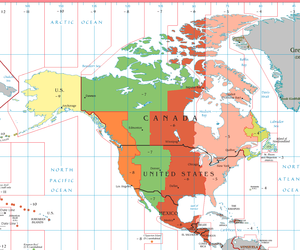North American Atlantic Time Zone
| Atlantic Time Zone | |
|---|---|
 |
|
| UTC offset | |
| AST | UTC−4:00 |
| ADT | UTC−3:00 |
| Observance of DST | |
| DST is observed in certain regions of this time zone between the 2nd Sunday in March and the 1st Sunday in November. | |
| DST began | 12 Mar 2017 |
| DST ends | 5 Nov 2017 |
The Atlantic Time Zone is a geographical region that keeps standard time—called Atlantic Standard Time (AST)—by subtracting four hours from Coordinated Universal Time (UTC), resulting in UTC-4; during part of the year some parts of it observe daylight saving time by instead subtracting only three hours (UTC-3). The clock time in this zone is based on the mean solar time of the 60th meridian west of the Greenwich Observatory.
In Canada, the provinces of New Brunswick,Nova Scotia, and Prince Edward Island reckon time specifically as an offset of 4 hours from Greenwich Mean time (GMT-4). Small portions of Quebec (eastern Côte-Nord and the Magdalen Islands) are also part of the Atlantic Standard Time Zone. Officially, the entirety of Newfoundland and Labrador observes Newfoundland Standard Time, but in practice most of Labrador uses the Atlantic Standard Time Zone.
No portion of the continental United States is located in the Atlantic Time Zone; however the territories of Puerto Rico and the U.S. Virgin Islands do fall under Atlantic Standard Time. A Massachusetts commission and other New England states are studying the possibility of changing to Atlantic Time year round.
...
Wikipedia
